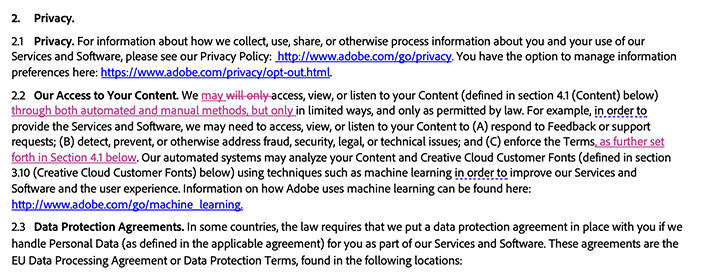Adobe Responds To Creator Outrage Over Controversial Photoshop ToS Update
The new terms popup began appearing this week, and it was not subtle. Users were forced to agree to the terms before they could access the application—Adobe wouldn't even allow uninstalling Photoshop without agreeing. The wording of the popup worried Photoshop users, many of whom use it professionally, editing content owned by a client or employer or covered by NDAs.
Adobe took its time to respond, and it now has a blog post that explains precisely what has changed in its terms and what it all means. The post includes a screenshot of the relevant terms with new sections highlighted. Under "Access to your content," Adobe changed a few words to clarify that it "may" access your content through "automated and manual methods."
Most of the wording is unchanged, so the policies have been in place for some time. Getting updated content from users just brought new attention to Adobe's intentions, which it goes on to explain in detail. Most importantly, Adobe is not claiming ownership over the content you create in Photoshop. Likewise, it will not use customer content to train its Firefly generative AI model.

The language about accessing your content is necessary, Adobe says, because certain features need to communicate with the cloud. For example, manipulating an image with Photoshop Neural Filters, Liquid Mode, or Remove Background communicates with Adobe servers. User-created content that lives on Adobe's servers is subject to possible review for illegal content like child sexual abuse material or phishing.
If you're still concerned about what Adobe may do with your data, you can take a step to protect yourself. In your account's privacy settings, you can opt out of contributing cloud-based content to Adobe's development and research efforts. This flag is called "Allow my content to be analyzed by Adobe for product improvement and development purposes," and it's found under the "Content analysis" section.


